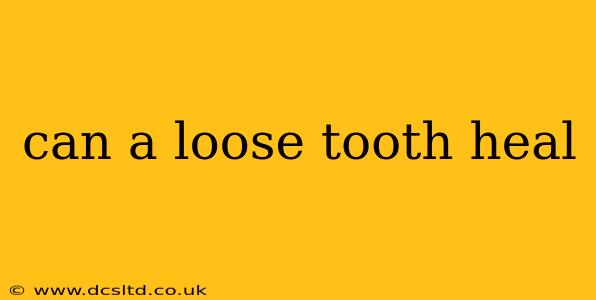A loose tooth is a common concern, especially for children experiencing teething or adults facing gum disease. The question, "Can a loose tooth heal?" doesn't have a simple yes or no answer. It depends heavily on the underlying cause of the looseness and the tooth's overall condition. Let's explore this in detail.
What Causes a Loose Tooth?
Several factors can contribute to a loose tooth. Understanding the cause is crucial in determining whether healing is possible.
-
Gum Disease (Gingivitis and Periodontitis): This is a leading cause of tooth loss in adults. Inflammation and infection destroy the tissues supporting the teeth, leading to loosening. Early intervention is key to preventing significant damage.
-
Trauma or Injury: A blow to the mouth or a significant fall can damage the periodontal ligaments holding the tooth in place, resulting in looseness.
-
Developmental Issues: In children, loose teeth are often a normal part of the growth and shedding process. These are typically baby teeth making way for permanent teeth.
-
Bruxism (Teeth Grinding): Chronic teeth grinding can put excessive force on the teeth and supporting structures, eventually leading to looseness.
-
Osteoporosis: This bone disease weakens the jawbone, making teeth more susceptible to loosening.
Can a Loose Tooth Heal Naturally?
The answer to this hinges heavily on the cause.
-
Loose Baby Teeth: These will naturally loosen and fall out as the permanent teeth erupt. No intervention is usually necessary.
-
Loose Teeth Due to Gum Disease: If the looseness is caused by gingivitis (early gum disease), improving oral hygiene and professional cleaning can often halt the progression and potentially allow for some stabilization. However, if the gum disease is more advanced (periodontitis), more intensive treatment like scaling and root planing, or even surgery, may be necessary to save the tooth. Early intervention is crucial here.
-
Loose Teeth Due to Trauma: In cases of trauma, the tooth may heal naturally if the damage is minor. However, severe trauma often requires intervention from a dentist to splint the tooth or perform other restorative procedures.
-
Loose Teeth Due to Bruxism: Addressing the underlying cause through stress management techniques or using a mouthguard at night is vital. This can prevent further damage and potentially allow some stabilization.
-
Loose Teeth Due to Osteoporosis: Unfortunately, the impact of osteoporosis on tooth support is difficult to reverse. Treatment focuses on managing the osteoporosis itself and supporting the remaining teeth.
How to Treat a Loose Tooth?
Treatment depends entirely on the underlying cause. A dentist will conduct a thorough examination to determine the cause of the looseness. Treatment options may include:
-
Improved Oral Hygiene: Regular brushing, flossing, and professional cleanings are essential for preventing and managing gum disease.
-
Scaling and Root Planing: This procedure removes plaque and tartar buildup from below the gum line.
-
Antibiotics: In cases of infection, antibiotics may be prescribed.
-
Splinting: This involves attaching the loose tooth to adjacent teeth for stability.
-
Surgery: In severe cases of gum disease, periodontal surgery may be necessary to regenerate bone and tissue support.
-
Extraction: If the tooth is beyond repair, extraction may be necessary.
What if My Loose Tooth is a Permanent Tooth?
If you have a loose permanent tooth, it's crucial to see a dentist immediately. Don't attempt any home remedies. Early diagnosis and treatment significantly increase the chances of saving the tooth.
What should I do if I have a loose tooth?
Seek professional dental care as soon as possible. A dentist can accurately diagnose the cause of the looseness and recommend the appropriate treatment plan. Delaying treatment can lead to more severe problems, potentially including tooth loss.
Can a loose adult tooth become tight again?
In some cases, yes, particularly if the looseness is caused by mild gum disease or minor trauma. With proper treatment and improved oral hygiene, the supporting structures can heal, leading to a tighter fit. However, this is not guaranteed, and the prognosis depends heavily on the extent of the damage.
In conclusion, while some loose teeth, like baby teeth, will resolve naturally, others require professional intervention. Prompt diagnosis and treatment are essential for preserving your oral health and preventing tooth loss. Always consult a dentist for any concerns about loose teeth.
